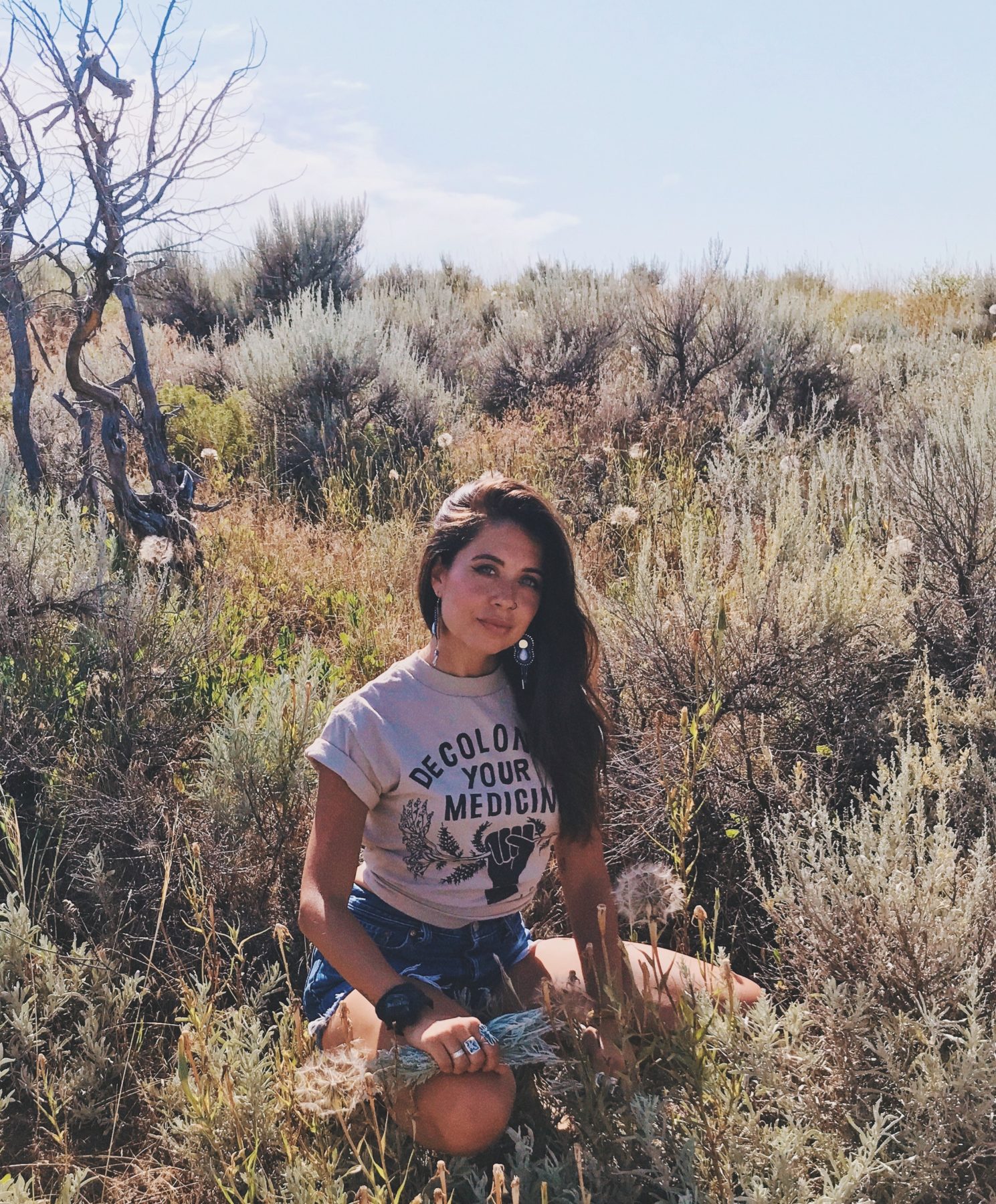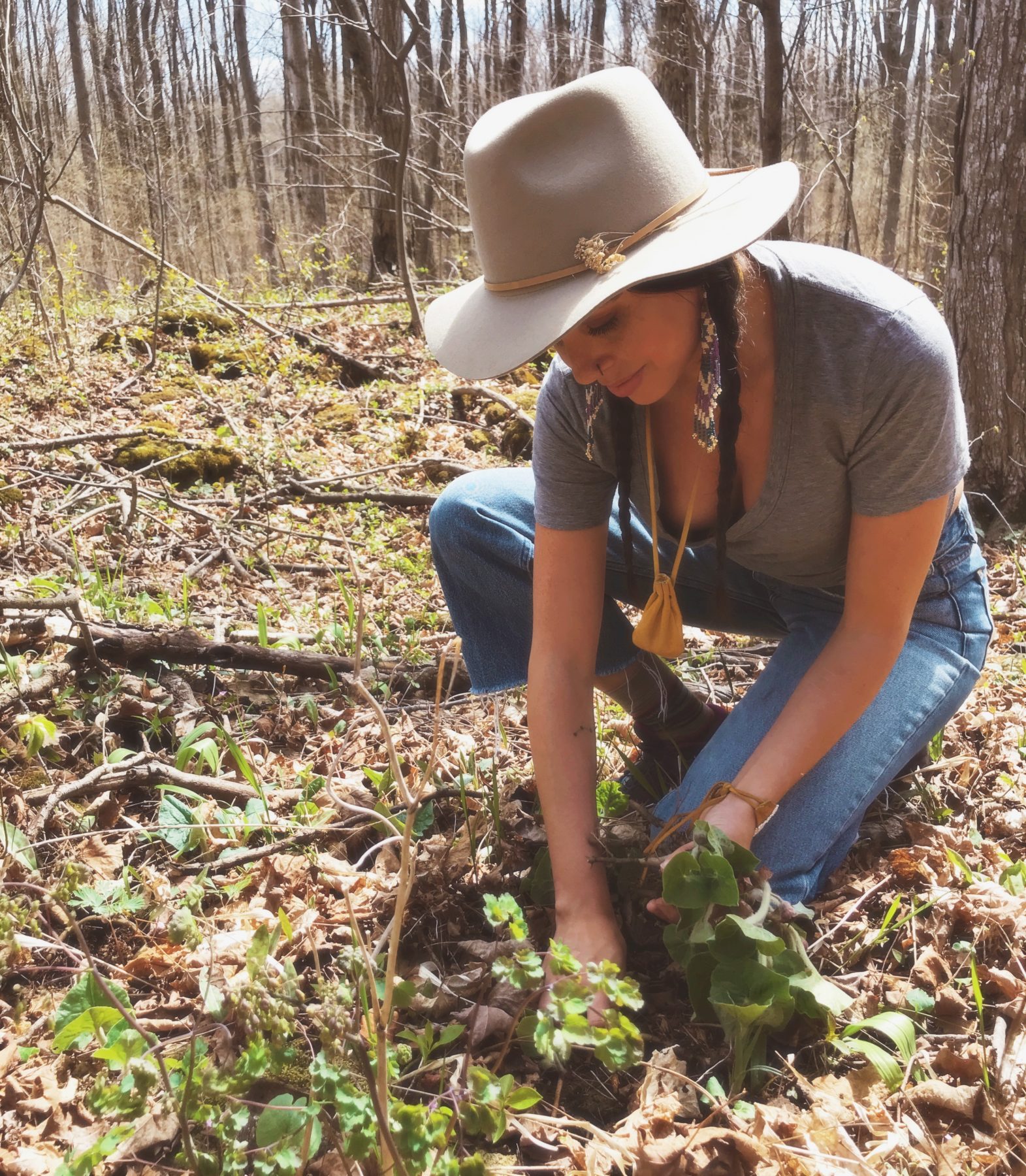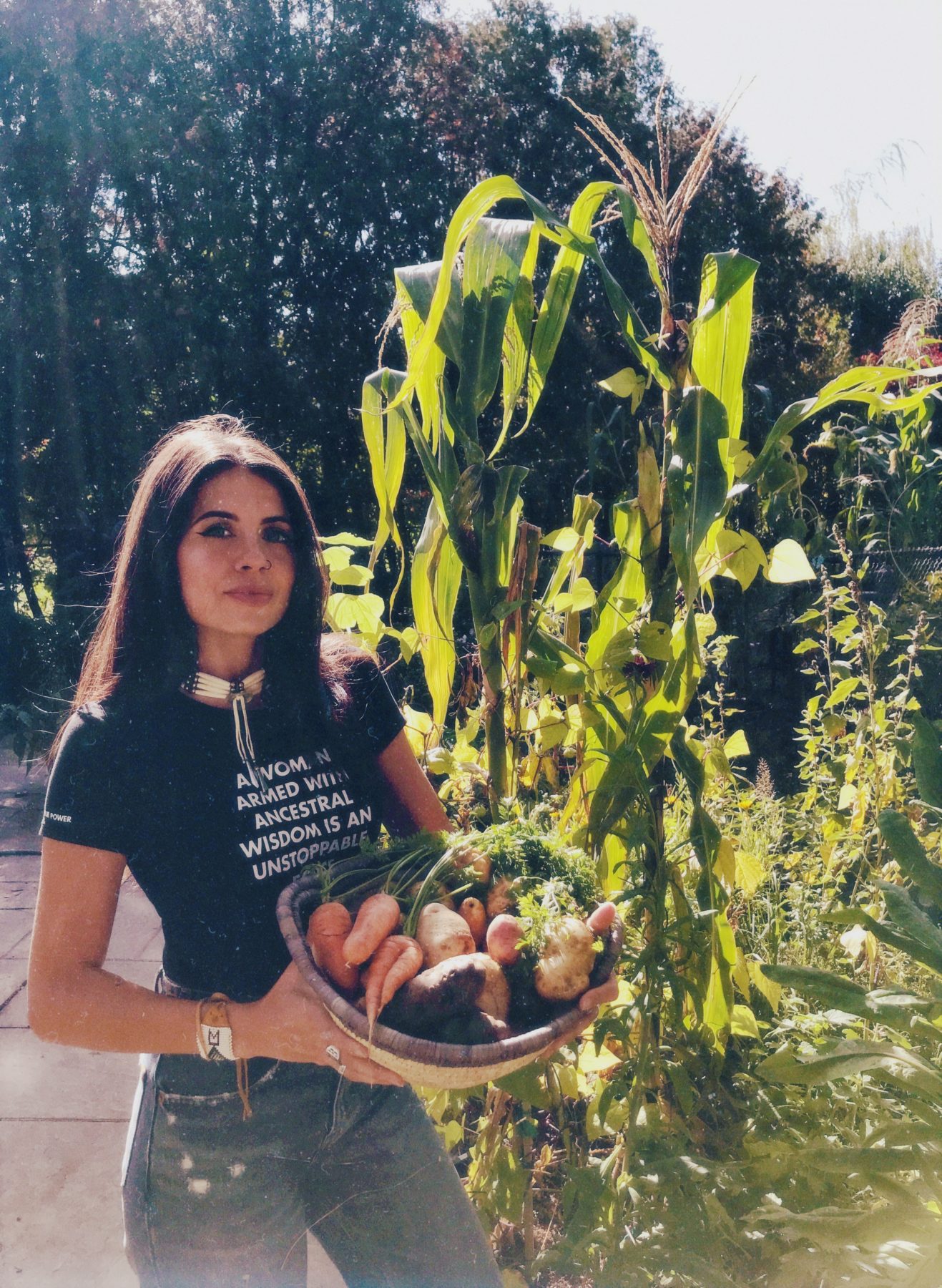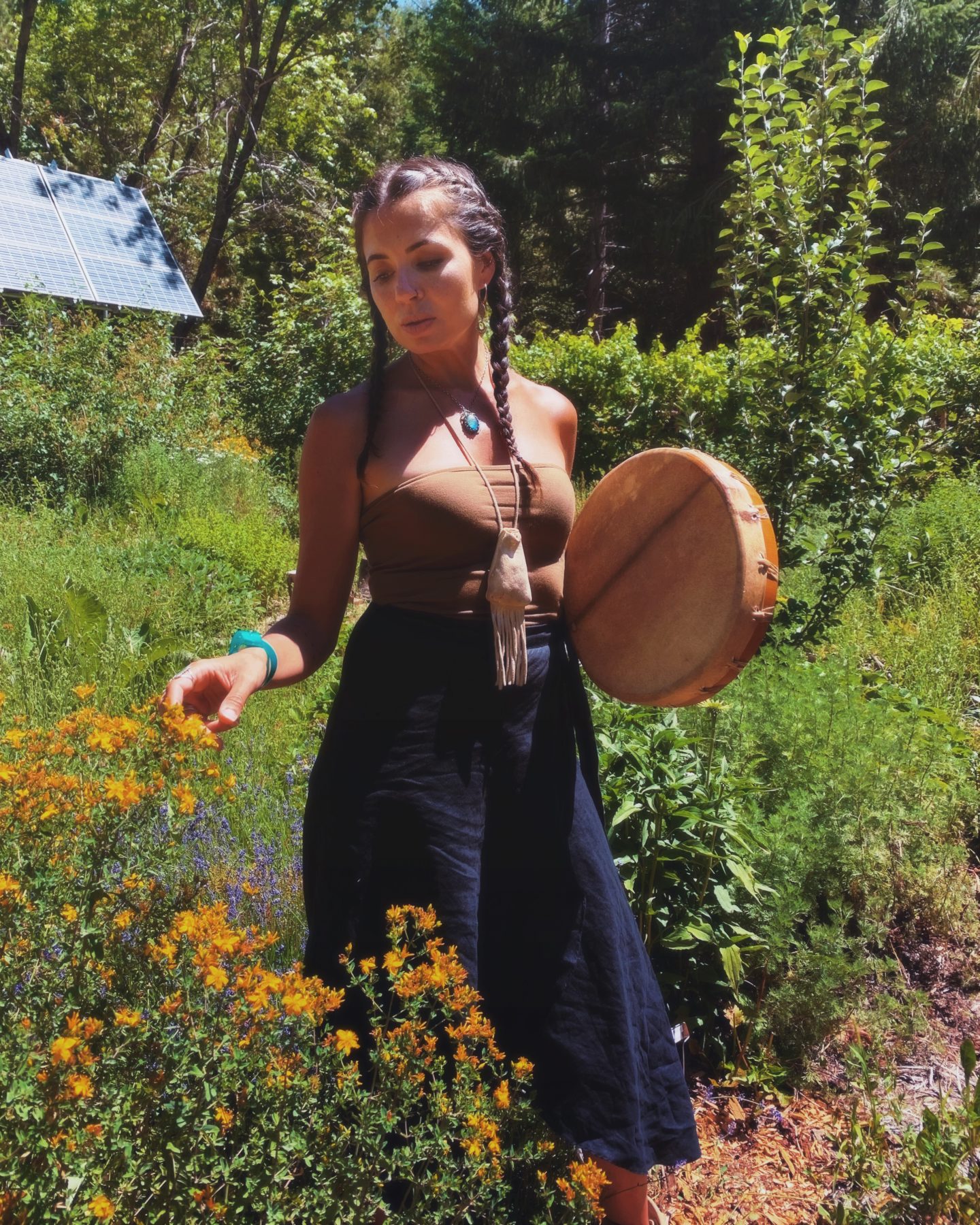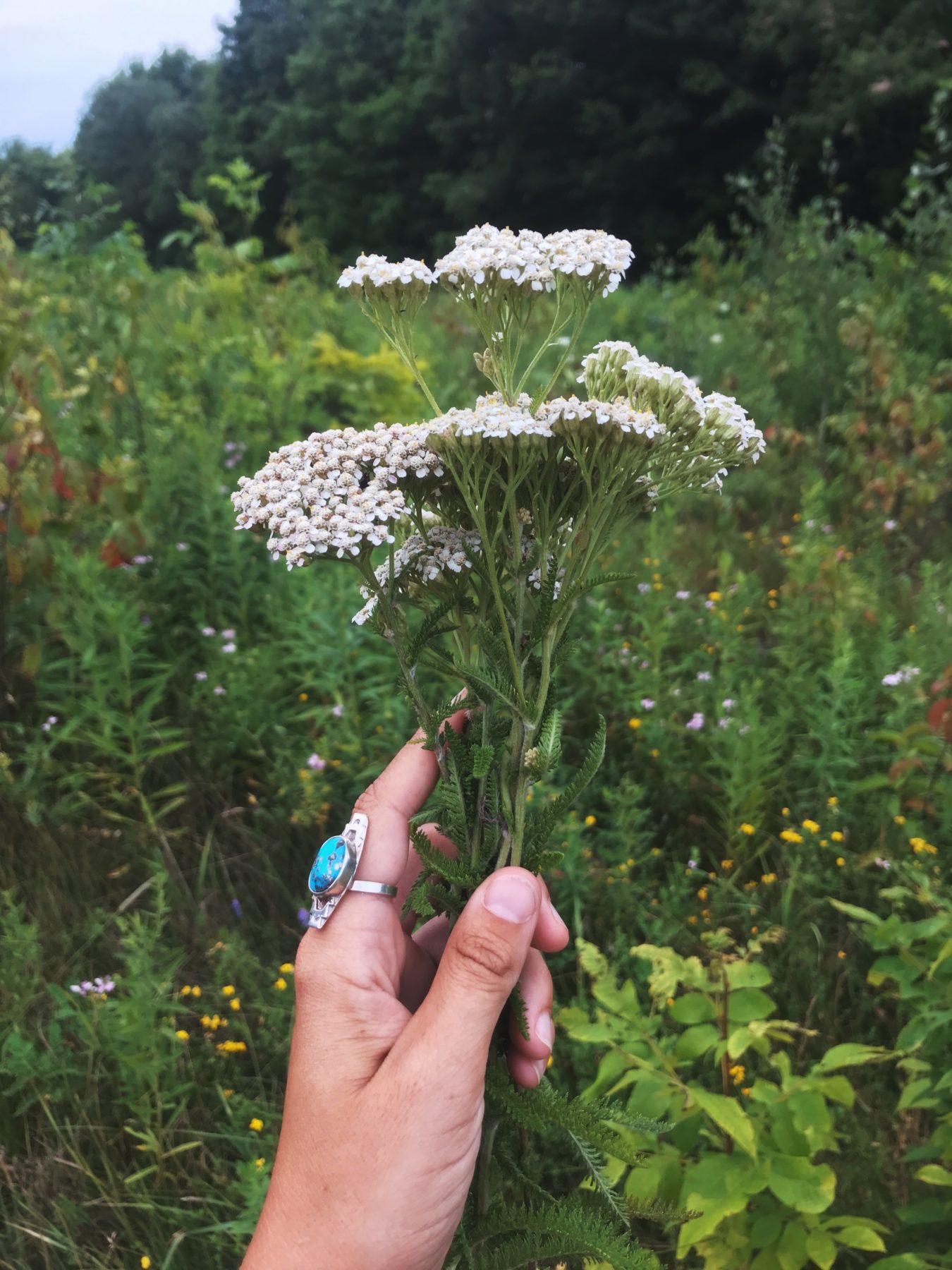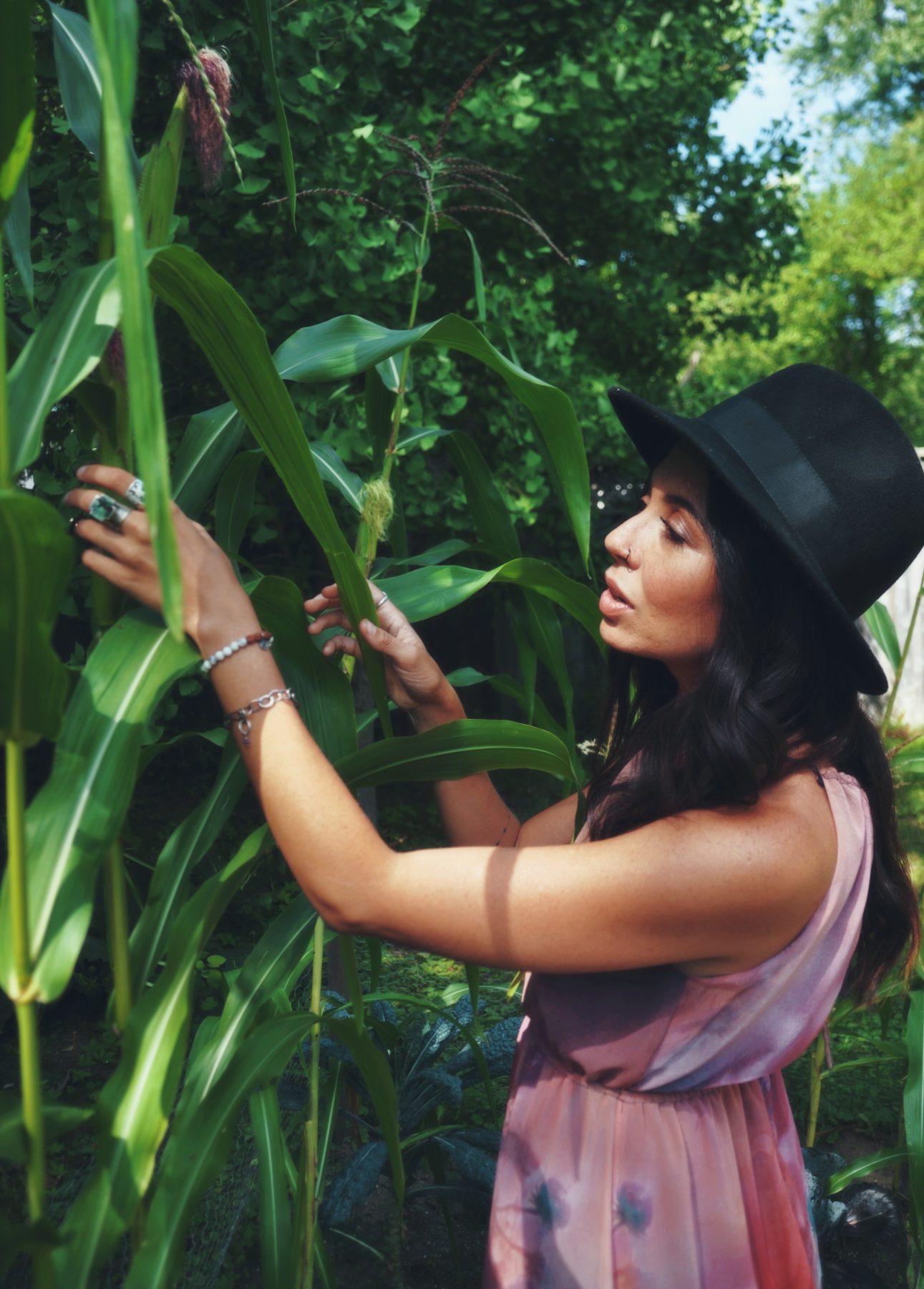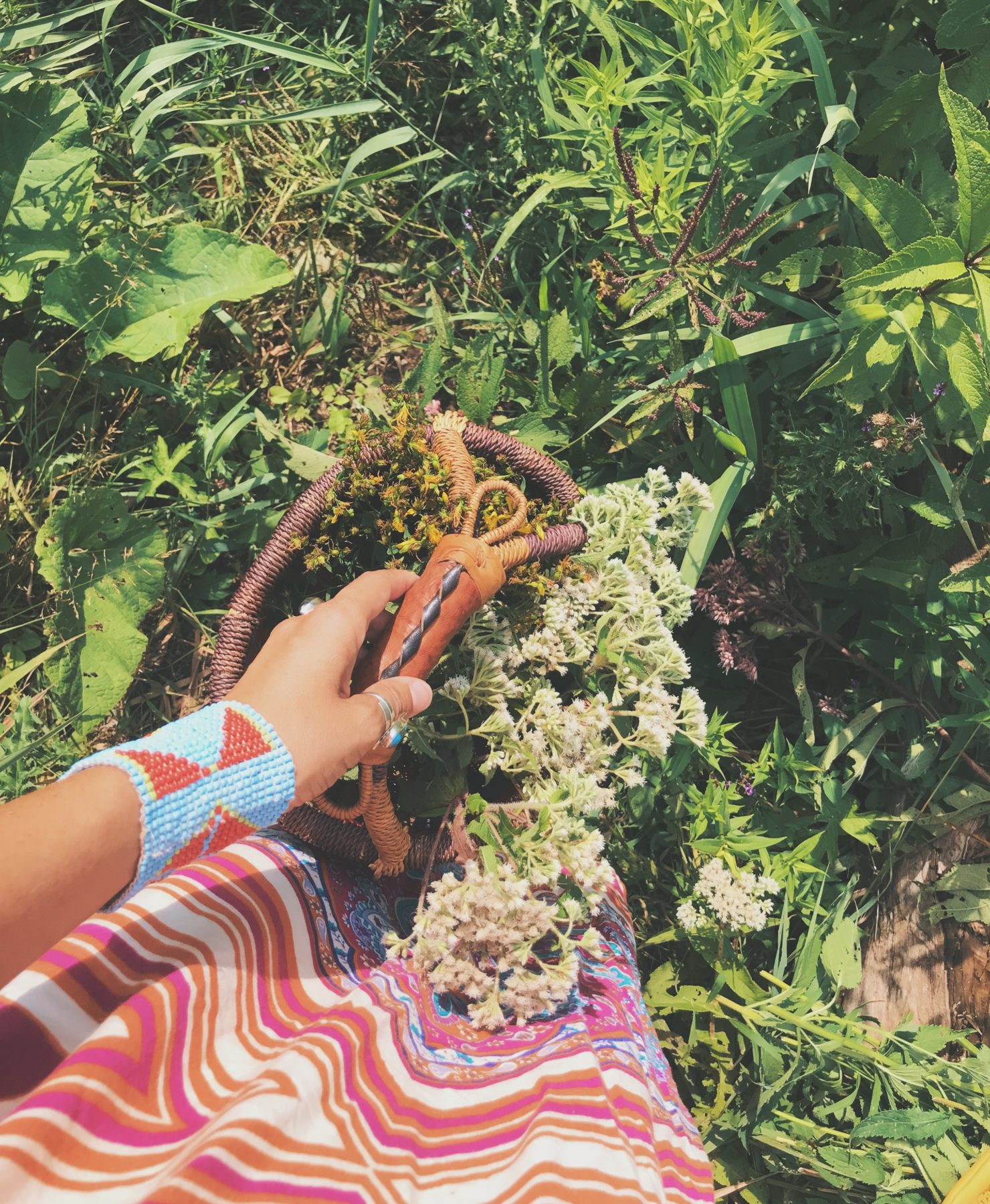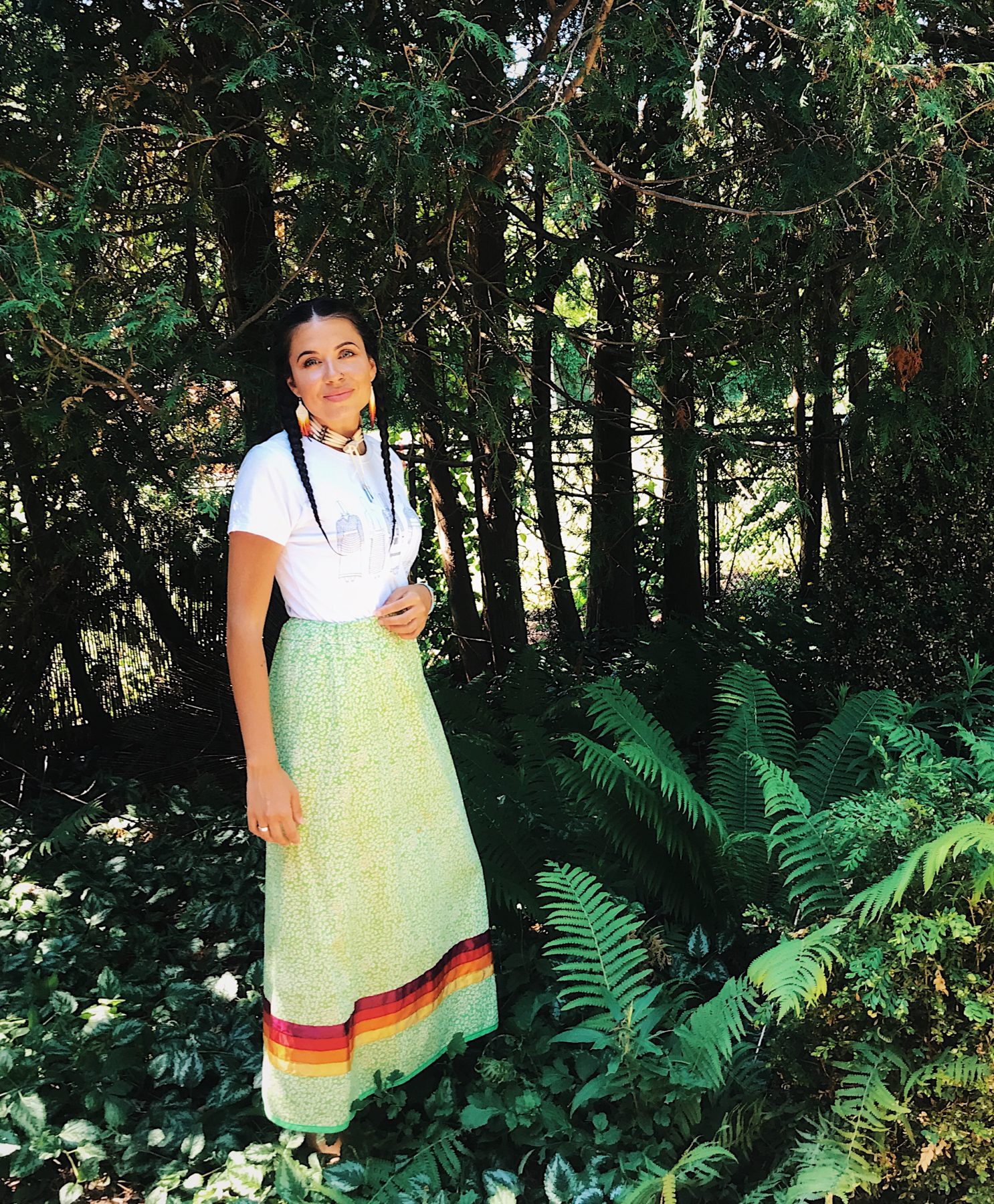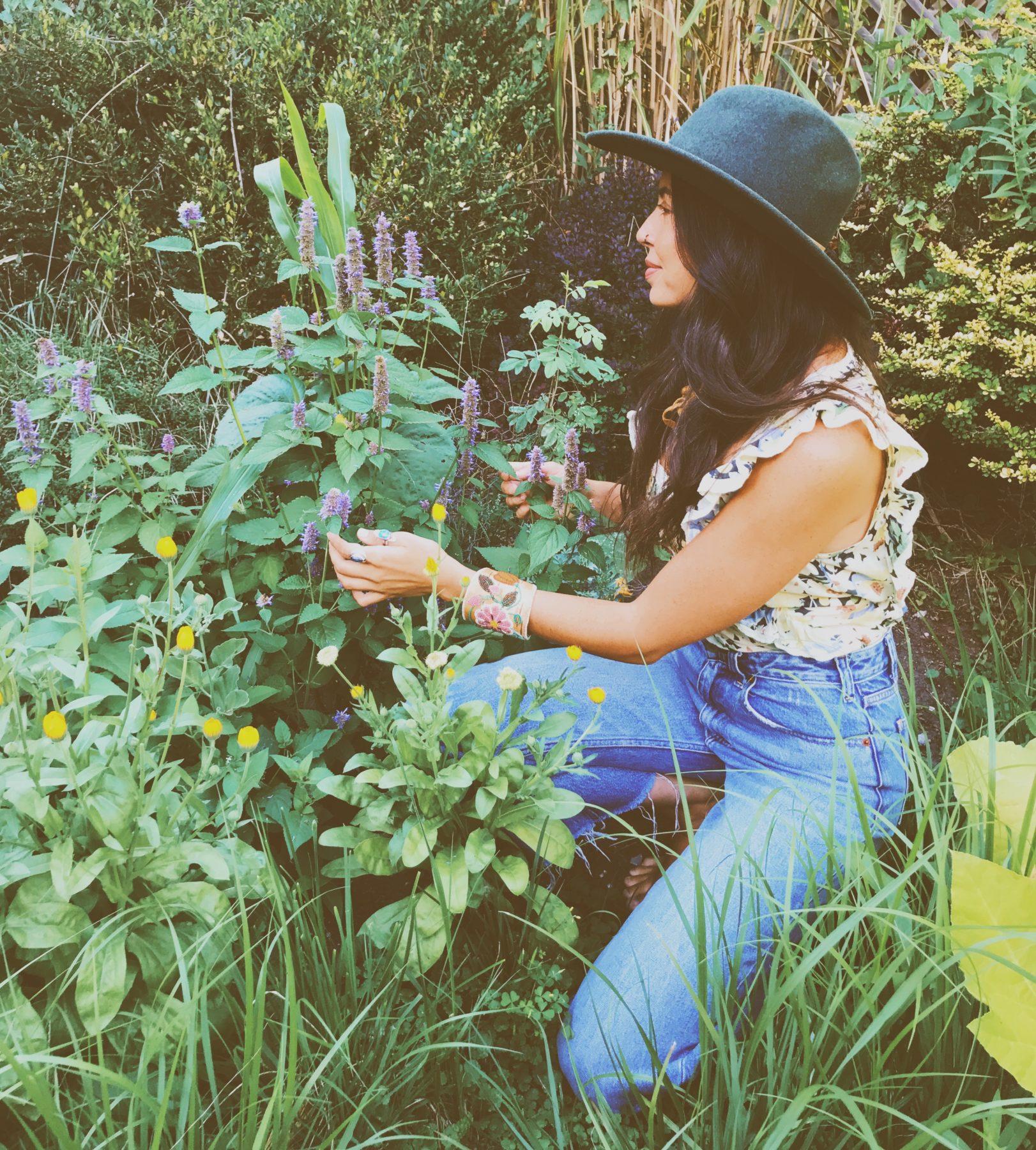Much of Canada is unceded Indigenous land. As settler-Canadians, learning more about our presence and relationship to the land we call home is vital work. We wanted to understand more about herbal and plant medicine from an Indigenous perspective, so we caught up with Yakama mixed Naturopathic Doctor Jacqui.
Dr. Jacqui Wilkins is a Plant Medicine Person, Doula, Teacher, Ceremony facilitator, Wisdom keeper, Naturopathic Doctor & Steward of the Earth. Originally from the Mountains of Montana (Apsáalooke Land), Jacqui is Yakama mixed. She is a Mama to a 4 year old Bear & spends much time tending to the Xálish Medicine garden in so called Ontario (Dish with One Spoon Treaty Territory) where she grows 40+ medicines, traditional foods & crafts Plant Medicines to share in Community.
She is passionate about sharing knowledge & wisdom of Earth based practices, Plant Medicines, Medicine Making, Ancestral reverence, postpartum support, and Earth tending (gardening) – to bring a sense of Connection & Community into our daily lives. Connecting to Plants in this way deepens our relationship with our Ancestors, the Land, the Animals & fellow Humans – to offer deep healing for all of our Relations. When we heal ourselves, we heal the Earth. And when we heal the Earth, we heal ourselves. Jacqui’s highest intention is to help you remember your connection to the Land, your place among Creation & your Spirit, to bring forth healing & harmony for all. To awaken sparks of remembering that are deep within, as we find our way Home together & reclaim our identities. In Love.
How did you begin your journey towards plant medicine and Naturopathic Medicine?
My journey started as a little one, before I could even verbally speak I was communing with the Trees + Land. It was a winding, and long road back. It’s truly been a lifelong journey of remembering that this is part of who I am as an Indigenous mixed person. As a child, I loved playing in the garden, and going out on the Land camping with the Mountains in so called Montana (Apsáalooke Land), with the Bears, Moose and Rivers. This way continued into my youth, making potions in the garden & creating healing Plant formulas for my family as a young adult. I veered off of my path for some time, aiming to conform to the over-culture & fear that I was ‘strange’ for speaking with the Plants + Trees this way, and for things like prophetic Medicine dreams. I hadn’t heard of the term Herbalist growing up in Montana, but was introduced into Naturopathic Medicine while living in Toronto going to make-up school when I was 24. I wasn’t attracted to the title of Doctor, per se, but I heard my Ancestors nudging me to this path. I now understand that this was their way of helping me remember, and come back to the Medicine I was born with, within my lineages. Through Naturopathic Medical school I started growing my own Medicines & going on the Land to get to know the Plants, their Spirit & the eco systems I was learning about.
What is your favorite part of the work you do?
Oh, there is so much I love about the work I do! I love being with the Plants, and tending to the Medicine garden, going out and being on the Land with them, forming relationships & listening to their stories. I love that this work involves honouring that pact we have with the Plants to protect the Land, and care for them. Every day it feels like a huge blessing when I am able to make medicines and share them with the world. Almost like that childhood joy of creating potions! I love dreaming new formulas, and creating time to be in silence to hear what Medicines may be most supportive for our Communities right now. Receiving feedback that the work I’ve shared has impacted someone’s life is one of the most rewarding aspects. Just knowing I’ve been even a small part of someone’s healing journey, their journey back Home to themselves & their Ancestors, is deeply fulfilling for me.
You offer plant medicine courses. Can you speak more to this choice?
I do! Yes, I think it’s vital we find ways in our work to support Community, and ensure *all* folks have access regardless of their income. For some courses I offer fully pay what you can, such as Working With Plant Medicines from the Heart. This course delves into ethical harvesting, and forming relationships with the Land + Plants. Others I offer Scholarship opportunities, specifically for Black, Indigenous & People of Colour. Keeping this knowledge within our Communities is vital, and there are many systemic barriers. There is a balance between ensuring makers are able to feel supported financially to pay for life expenses, while also ensuring Communities are taken care of and all members have access. It’s a more in depth answer, but it’s something that is always at the front of my mind and heart. For me, it’s part of that responsibility of taking care of one another while also rippling out that healing to others as well.
You create Xálish Medicines. Do you feel it is important to educate consumers about traditional plant uses?
Yes, and no. I feel this question can be taken so many different ways. I love educating & teaching. I love sharing about Plant Medicines, and helping guide folks in remembering how to work with Plants. For me, the root of working with any Plant in any form, is relationship. So this is a key part of how I share. It is much more than ‘use this herb for xyz condition.’ It is about actually getting to know the Land, the Plants, the Original People of the Land, what the eco system is like, what the Plants need to thrive, etc. It’s about connecting as we would with any living being. I don’t tend to use the word ‘consumer’ as I feel it has implications of over-consumption of the Plants. Xálish Medicines is rooted in relationship.
As far as each individual Plant’s healing properties, I do enjoy sharing what I’ve learned as well. And, I love learning from others. In one of my favourite courses that I teach, we work with one Plant for 2 weeks at a time, to really get to know them. My lens is as a person of Mixed lineages and living within a broken maternal lineage. So the Traditions I share reflect this. Sadly, I do not have any living Yakama elders to share our Plant wisdom with us, but I do speak with Ancestors often. What I teach is a blend of Indigenous wisdom, direct teachings from the Plants + my Dreams, and clinical knowledge from my time in Naturopathic Medical school. This last part brings some complexity, as some of what is taught about Herbal Medicine is appropriated. Black & Indigenous wisdom has been exploited by “Western Herbalism,” in many ways. There are a lot of folks doing amazing work to repair this, and also reclaim our Medicines. Each Plant has so many beautiful aspects, so to share about their entire healing picture or Spirit within one formula isn’t really possible. Which is why I create longer courses that encourage connection.
How CAN THE health & wellness industry can be more inclusive of Indigenous voices?
I think this question is quite complex, and there will be many answers & many ways as we are all unique. We may have many different perspectives. I don’t speak for anyone but myself. One of the ways to be more inclusive is just listening to Indigenous voices. Simply. Listening with an open heart, with ego set aside. Listening from a place of genuinely wanting to understand, even if it means understanding pokes at ones current ways of existing. We are in a time where so much is being uncovered, and shifted. It may bring up feelings of being uncomfortable, especially when privileges & harms done are acknowledged. Often, folks may get defensive when their way of being is questioned. Even if their way of being is rooted in the oppression of others, it may be hard to see that. And so, coming from a place of being able to listen fully, change, and grow together, feels really important for inclusivity. Otherwise, it may cause more harm for Indigenous folks to speak, only to be silenced within the wellness industry. I’ve had this happen many times, and it creates further harm. So. Deep listening & willingness to change, to truly look at ones bias and colonial programming are good places to start.
How do you connect to the land to do that important healing work?
I believe we all have this ability to connect with the Land, and form these relationships. Asking permission, and making offerings, are always my first steps. For example, if I’m going to a Forest for a walk I will stop before I enter and just introduce myself, ask permission, and make an offering {often a blend of Traditional Tobacco, and Plants from the garden – but this may vary based on one’s lineage, what they feel comfortable with – a song or words may also be an offering. There are many ways to make offerings}. I have heard no before. Sometimes it is just a feeling, an apprehension. If I hear no, then I go somewhere else. Treating the Land, and the Plants like we would other people, with respect, reverence, love, mutual consent, etc. is an important step in connecting. From there, dropping in to my body and Heart space, getting out of my head, and just being with the Land. It may take some time to hear. Folks often talk away their intuition by saying “oh I must’ve just made that up.” Trusting ourselves, intuition, Spirit, our Ancestors, is also an important part of that connection. Knowing the Plants speak to us in ways we will understand – in colors, fragrances, feelings, memories, dreams, sounds, etc.
You mention Sacred Activism and awakening the Protector in each of us. What does sacred activism mean to you and how do you practice it?
Ah, yes, I wrote that blog post almost a year ago. I was really feeling an awakening among many folks to hear the calls of the Earth & Creation, to come back into Harmony and right relations in all ways. It has been interesting to witness the shifts since then. To me, Sacred Activism is a way of being. I’ve alluded to it in previous questions as a way of Life, of Protecting the Water, the Land, Animals and one another. It is rooted in Harmony, balance, and decenters Humans as the center of living beings. It questions systems of oppression that seek to harm and cause destruction to the Earth, and all of their inhabitants. Some of the ways I practice, are by teaching others, growing Food & Medicines in a good way, showing up at marches and Land Defending events when I am able to, giving Medicines to folks who are on the front lines protecting, checking in on Community members who are also active & giving so much, picking up garbage and caring for the Land around me, reducing waste & using sustainable packaging for Xálish Medicines, etc.
Love is centered in your work (which we LOVE!). Why do you think love is an important part of plant medicine?
I LOVE love too, haha. I think there is a superficial concept of Love, and then there is the type of Love that reverberates as oneness with all of Creation. That feeling of Harmony, and genuine care for everything in existence, the seen & unseen. To me, this type of Love, is what weaves us together. It is the common thread that connects us all, the stones, the water, the plants, humans, animals, insects, the stars – all of it. As cheesy as it may sound, I really believe in authentic & genuine love’s ability to heal and restore harmony. If we feel Love as a vibration, this may help it make more sense, aligning our own vibration with that of Nature. I also feel that love is a big part of my personal medicine, an Elder & mentor (James Carpenter Greycloud) has reminded me that part of the bundle I carry is my Heart and ability to Love expansively, to share that Love through Medicines & being a Naturopathic Doctor, to remind others of this love and facilitate healing.

